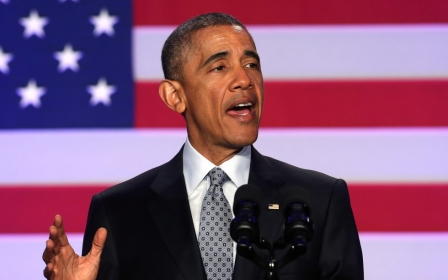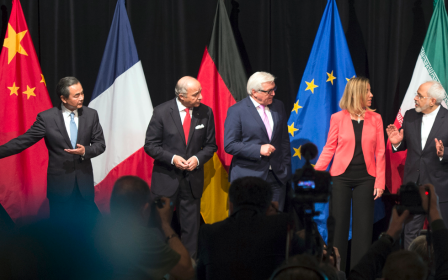Obama warns Congress to accept Iran deal

Barack Obama has welcomed the nuclear deal with Iran with thinly veiled warning to Congress to accept the proposal.
Speaking on Tuesday morning, just hours after more than two weeks of political wrangling finally produced a comprehensive deal on Iran’s nuclear programme, Obama emphasised that a world where the agreement was not accepted would be far more dangerous for the United States.
“I will veto any legislation that prevents successful implementation of this deal,” he said.
“We’re dealing with a country that has been a sworn adversary of the United States for many years and I welcome scrutiny of the deal, but I would say to Congress that you do not make deals like this with your friends.
“No deal means a greater chance of more war in the Middle East.”
Nearly immediately after the speech, House Speaker John Boehner said reining in Iran's nuclear program in exchange for sanctions relief will only "embolden" Tehran and trigger an atomic weapons race.
"Instead of stopping the spread of nuclear weapons in the Middle East, this deal is likely to fuel a nuclear arms race around the world," said the Republican Boehner in a statement, adding that US lawmakers will "review every detail of this agreement very closely."
Obama took great pains to outline the details of the deal, including the fact that Iran is now permanently prohibited from pursuing a nuclear weapons programme.
Iran will cut its number of centrifuges by two thirds, from about 19,000 to 6,104 and will get rid of 98 percent of its uranium stockpile – a restriction that will last 15 years.
Speaking from Tehran, President Hassan Rouhani hailed the deal, saying "God has accepted the nation's prayers."
“Honourable Iranian nationals, all sanctions, including on missiles, will be lifted during implementation. Not suspended, lifted,” he said.
"Implementing of this agreement is the beginning of trust (in relations with the West). Gradually we can say the wall of mistrust will be removed," he added, despite Obama's insistence in his speech that the deal was built on verification rather than trust.
“What mattered the most was the steadfastness, patience and resistance shown by the courageous nation of Iran. Today with the grace of god it has been the year that brought about victory and success to us.”
Rouhani was elected on a wave of optimism that having a moderate in power could lead to thawing relations with the US.
Responsibility to future generations
Earlier on Tuesday, the EU’s foreign policy chief Federica Mogherini described today as “historic” and stated that the achievement was the result of a collective effort.
“With courage, political will, mutual respect and leadership we delivered on what the world was hoping for: a shared commitment to peace and joined hands to make our world safer.”
“No one thought this would be easy,” she continued. “Historic decisions never are. We have always been aware we had a responsibility to our generation and future ones.”
Under the deal, Mogherini said, Iran “reaffirms that under no circumstances will it seek, acquire or develop nuclear weapons” in return for the “complete lifting of all sanctions related to Iran’s nuclear programme”.
Iran’s Foreign Minister Mohammad Javad Zafir read out the same paper in Farsi.
Other sanctions maintained
Obama also sought to reassure Israel after Prime Minister Benjamin Netanyahu called the deal “an historic mistake”.
“We will maintain our own sanctions in relation to terrorism, human rights violations,” Obama said.
Under the deal, there will be 24-hour access to Iran’s nuclear facilities, and a review of its previous nuclear programme to examine whether it had a military nature.
The breakthrough deal came on the 18th day of marathon talks in Vienna between Tehran and the so-called P5+1 - the United States, Russia, China, Britain, France and Germany.
The deal with the P5+1 group of states will grant Iran relief as crippling sanctions will be progressively lifted, in return for curbs on its nuclear programme and fuel stockpile over the next 15 years.
It will now pass to the UN security council to be reviewed and implemented.
Stay informed with MEE's newsletters
Sign up to get the latest alerts, insights and analysis, starting with Turkey Unpacked
Middle East Eye delivers independent and unrivalled coverage and analysis of the Middle East, North Africa and beyond. To learn more about republishing this content and the associated fees, please fill out this form. More about MEE can be found here.




